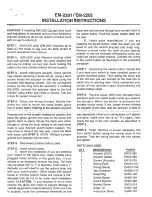
DRIVER SUPPORT
* Option/accessory, for more information, see Introduction.
258
Adaptive Cruise Control (ACC)
*
ACC is an optional system designed to assist
the driver by maintaining a set speed or a set
time interval to the vehicle ahead.
The driver sets that desired speed and time inter-
val to the vehicle ahead. When the camera and
radar sensor detects a slower moving vehicle
ahead, your vehicle's speed is automatically
adapted. When there are no longer slower mov-
ing vehicles ahead, your vehicle will accelerate to
resume the set speed.
ACC is designed to follow a vehicle ahead in the
same lane and maintain a time interval to that
vehicle set by the driver. If the radar sensor does
not detect a vehicle ahead, ACC will instead
maintain the speed set by the driver.
ACC is designed to smoothly regulate speed.
However, the driver must apply the brakes in sit-
uations that require immediate braking. This
applies when there are great differences in
speed between vehicles, or if the vehicle ahead
brakes suddenly. Due to limitations in the radar
sensor, braking may occur unexpectedly or not at
all.
Adaptive Cruise Control can follow another vehi-
cle from a standstill up to 125 mph (200 km/h).
Always observe posted speed limits.
WARNING
•
It is advisable to read through all of the
related articles pertaining to ACC (see
the list at the end of this article).
•
Adaptive Cruise Control cannot cover all
driving situations and traffic, weather and
road conditions.
•
This system is designed to be a supple-
mentary driving aid. It is not, however,
intended to replace the driver's attention
and judgement. The driver is responsible
for maintaining a safe distance and speed
and must intervene if Adaptive Cruise
Control does not maintain a suitable
speed or suitable distance to the vehicle
ahead.
•
Maintenance of ACC components may
only be performed by a trained and quali-
fied Volvo technician.
Overview
The distance to the vehicle ahead (in the same
lane) is monitored by a radar sensor. Your vehi-
cle's speed is regulated by accelerating and
braking. The brakes may emit a sound when they
are being modulated by the adaptive cruise con-
trol system. This is normal.
WARNING
•
Adaptive Cruise Control is not a collision
avoidance system. The driver is always
responsible for applying the brakes if the
system does not detect another vehicle.
•
Adaptive Cruise Control does not react to
people or animals, or small vehicles such
as bicycles and motorcycles. It also does
not react to slow moving, parked or
approaching vehicles, or stationary
objects.
•
Do not use Adaptive Cruise Control in
demanding driving conditions such as city
driving or other heavy traffic situations, in
slippery conditions, when there is a great
deal of water or slush on the road, during
heavy rain or snow, in poor visibility, on
winding roads or on highway on- or off-
ramps.
WARNING
The brake pedal moves when the adaptive
cruise control system modulates the brakes.
Do not rest your foot under the brake pedal.
Summary of Contents for XC90 T8 TwinEngine Plug-In Hybrid
Page 1: ...WEB EDITION OWNER S MANUAL...
Page 2: ......
Page 13: ...INTRODUCTION...
Page 17: ...INTRODUCTION 15 Overview...
Page 19: ...INTRODUCTION 17 Preparations for charging the hybrid battery p 372 Starting the engine p 364...
Page 58: ......
Page 59: ...SAFETY...
Page 94: ...SAFETY 92 Related information Airbag system p 87 Seat belts p 62...
Page 95: ...INSTRUMENTS AND CONTROLS...
Page 175: ...CLIMATE...
Page 204: ......
Page 205: ...LOADING AND STORAGE...
Page 221: ...LOCKS AND ALARM...
Page 246: ......
Page 247: ...DRIVER SUPPORT...
Page 339: ...STARTING AND DRIVING...
Page 396: ......
Page 397: ...INFOTAINMENT...
Page 434: ......
Page 435: ...WHEELS AND TIRES...
Page 462: ......
Page 463: ...MAINTENANCE AND SERVICING...
Page 508: ......
Page 509: ...SPECIFICATIONS...
Page 511: ...SPECIFICATIONS 509 Location of labels...
Page 533: ......
















































